- Home
- Alice Hoffman
Fortune's Daughter: A Novel Page 13
Fortune's Daughter: A Novel Read online
Page 13
“I’m Rae,” she said when Hal faced her, but she could tell from his puzzled look that her name didn’t mean anything to him.
Inside the corral, the horses were so excited as they ate hay that their bodies seemed to shake. They were shaggier than most horses, and even when they ate they stayed crowded together, as though they were afraid to be alone. Rae couldn’t take her eyes off them; the longer she watched them, the more difficult it was for her to breathe.
“It takes a while to get used to the air out here,” Hal said after he’d walked out of the corral and shut the gate behind him.
He took her inside the trailer. The place was a mess—kitchen cabinets left open, clothes tossed all over the floor—and everything was so tiny that Rae felt more uncomfortable than usual about her size. She had to turn sideways to get into the kitchen and sit down. At the rear of the trailer was a set of bunk beds; Rae could tell that the person asleep in the lower bunk was Jessup just by his shape beneath the blankets.
“I can’t believe this is what he spent my money on,” Rae said.
Hal poured himself a cup of coffee and offered one to Rae, but she refused with a wave of her hand.
“I could kill him,” she said.
Hal handed her the sugar bowl. “We’re out of milk,” he said. “We’ve got Cremora, but I never use it. It always gives me a terrible headache.”
Rae looked at him as if he were the stupidest person on earth. “I’m upset,” she said. “Can’t you tell how upset I am? Don’t you talk to me about Cremora.”
Hal took some orange juice out of the small refrigerator and poured her a glass. He sat down across from her without saying a word and watched her drink.
“We’ve been together for seven years,” Rae said. “That’s not even counting high school. I don’t suppose he ever mentioned me?”
Hal shook his head. “The longest I ever lived with someone was two years and seven months,” he said. “Her name was Karen.”
Rae nodded, expecting more, but Hal clammed up.
“I left her,” Hal said finally. “I guess I’ll always regret it.”
Jessup moved in his sleep, and Rae and Hal looked at each other.
“He never gets up on time,” Hal said. He took a sip of black coffee. “And of all the things he never told me, he certainly didn’t mention a wife who was pregnant.”
“We’re not married,” Rae said. And to herself she thought: This is really it. I really could kill him.
In his sleep, Jessup heard Rae’s voice, and he dreamed that he was talking to Rae on the telephone in his mother’s apartment in Boston. Whenever he used to talk to her, he’d felt as if there was nothing he could not do. Back then, all they’d needed was enough money for gas. Everything was out in front of them, possibilities were endless. Jessup woke up, but he lay in the lower bunk bed without moving and he counted the weeks until his thirtieth birthday. He had been born in the dead center of March, in one of the worst snowstorms ever to hit Boston. He just couldn’t wait to be born, his mother had told him. She could feel his head moving downward as the taxi drove to Brigham and Women’s Hospital, and he’d been born in the elevator, between the third and fourth floors.
Rae had admitted to Hal that she was starving, and he’d decided to drive into Barstow and get food. Jessup stayed in bed until he heard the trailer door slam and Hal’s car start. Then he got up and pulled on a pair of jeans and a sweater. Rae heard him coming up behind her, but she didn’t look at him, not until he navigated around the table and faced her.
“I was just thinking about sending you my new address,” Jessup said.
“I’m here for my money,” Rae told him. “You couldn’t possibly have spent it all on a down payment for this.”
“I’m just curious,” Jessup said. “How’d you find out where I was?”
“If you really want to know,” Rae said, “from a waitress in Barstow.”
“Paulette,” Jessup said. “Well, I think I ought to tell you that she’s nothing to me.”
“Look,” Rae said, “I don’t care what she is. I want my money.”
Jessup lit a cigarette and leaned against the refrigerator. “I don’t have it, Rae. I used half as a down payment, and the rest went to fix this place up. We’re going to build a new corral, and we’re buying a pickup truck—we’ve got expenses.”
“Get the money back,” Rae said stubbornly.
“Let me just tell you my plan.”
“Get it from that waitress,” Rae said. “She must save her tips.”
“I told you already. She’s nothing,” Jessup said. He seemed pleased every time Rae mentioned Paulette. “Let me just explain my plan. These horses we’ve got are the perfect pet for people with money. Compared to one of these horses, a dog is nothing. What I’m saying is you’ll have to just wait a while for your money. But I intend to pay you back.”
“How could you do this to me?” Rae said. “What did you think I needed money for, a trip to Tahiti? I’m having a baby, Jessup.”
“Let me just show you the place,” Jessup said.
He got her a heavy sweater and opened the trailer door.
“Come on,” he urged. “Just take a look.”
They went out to the corral; the horses were now huddled at the far side. When he showed her the barn, Rae put her hand to the small of her back and rubbed the muscles that had been aching all morning. She realized then that the baby was pushing down on her bladder and that she’d never make it back to the trailer. She went out behind the barn, crouched down, and peed, and when she got up she saw Jessup watching her.
“Don’t look at me,” she said.
“Why not?” Jessup said. “You look really good. I never saw anybody pregnant look so good.”
“What’s that supposed to mean?” Rae said.
“It’s a compliment. But then I always thought you looked good,” Jessup said. “I picked you, didn’t I? Didn’t I ask you to leave Boston with me?”
Actually, he had, and afterward she’d wondered if she’d imagined it. He was walking her home one night; as usual they had stopped on the corner before Rae’s block. That was the night he told her that he planned to leave Boston. He hadn’t been looking at her, but as she watched Jessup, Rae felt as though she could see the shell around him crack open, and for a second she could see inside him.
“I mean, it’s totally up to you,” he had said casually. “I’m used to being alone, but if you want to go I’m not going to stop you.”
“Maybe I will leave with you,” Rae said, trying to sound just as casual. After that she kept sneaking looks at Jessup, searching for that crack in his shell, and at certain angles she could almost see it. But she never again had the sense that she was looking inside him, and it began to seem ridiculous that she had once imagined she could see past his skin to a thin band of light.
Whatever had happened, she had certainly never felt chosen by Jessup, and now it didn’t matter who had done the choosing.
“I’ll never forgive you for this,” Rae said.
“I guess not,” Jessup said.
They were at the corral when Hal drove up with the groceries. They turned to watch him carry the bags into the trailer.
“Don’t you care that this is your baby?” Rae asked Jessup once Hal had gone inside.
“What if I did?” Jessup said. “What good would it do me? Even if I wanted to be his father, how could I be? I’d just ruin it—I’d end up disappearing and the guy would hate me in the end, so I might as well get all that over with now.” Jessup lit a cigarette. It was windy, so he had to cup the lit match in his hand. “If we had planned it, it might have been different,” he said. “I could have gotten some place like this ranch before, and by the time the kid was born I would have been rich.”
She knew he wasn’t going to give her any of the money back, and somehow Rae didn’t even care any more. She gave him back his sweater and walked over to the Oldsmobile. The engine took a while to turn over, and once it did Rae
had to pump the gas to keep it going. Through the closed car windows she could still smell the horses. If she hadn’t been pregnant she might have actually considered moving here, in spite of the waitress and the fact that he hadn’t even asked her to stay. Usually, she didn’t take up much space—she could have slept beside him in the bunk bed, her spine against the metal wall. It would have been easy enough to wash all the dirty dishes with boiling-hot water, and the clothes left strewn on the floor would have taken a half hour at most to hang up. At night, the horses would run in circles, and the coyotes would come down from the hills to watch them, a little braver and a little closer to the corral each time. But, of course, she was no longer really alone, and Jessup would never be able to understand her putting somebody before him.
Just as she was about to leave, Jessup walked over and tapped on the window. After Rae rolled it down, he surprised them both by taking her hand. For a moment Rae swore she could see the stream of light just beneath his skin, but she forced herself to look away.
When Rae put the car in gear Jessup let go of her hand. But before she drove back onto the dirt driveway Rae turned to him and smiled.
“You’re going to miss me,” she said, and she didn’t even give him a chance to disagree.
In Barstow, Rae stopped at a diner and got herself a sandwich to go, which she ate as she drove over the mountains. There was a thin cover of snow on the ground, and even though the altitude was higher, it was already easier to breathe. By the time she reached the flatlands it was possible to pick up L.A. radio stations. The air grew warm enough to turn the car heater off. She wasn’t thinking about Jessup, she was thinking about those horses, and the more she thought about them the more relieved she was that she didn’t have to spend another moment watching them move along the wooden fence. The whole time she had been with Jessup she had been seeing those horses. Even when she wasn’t looking she could still see them out of the corner of her eye, like a shadow that kept getting in the way of her line of vision.
She got home in the middle of the afternoon. After she’d parked the Oldsmobile and gotten out she noticed a Volkswagen parked in front of the entrance to the apartment complex. As she walked by she could tell that the man in the driver’s seat was watching her, and halfway across the courtyard she knew that he was following her. Rae walked faster and kept her keys between her fingers, sharp edge out. When she heard him clear his throat she started to run. For the first time in weeks she wished desperately that Jessup were in the apartment and that all she had to do was shout his name and he’d open the front door.
“Are you Rae?” she heard the man behind her call.
She kept running.
“Rae?” he called.
She turned and faced him. He was standing in the middle of the courtyard watching her.
“What if I am?” Rae said. She was less than fifty feet from her own door, and if she ran she could make it there before he had the chance to move.
“I’m Richard Grey,” he told her. “Lila’s husband.”
Now that he was here he felt slightly ridiculous. He’d found her address in Lila’s phone book, but it was really none of his business.
Rae looked over her shoulder, at her front door. Being afraid had started her wishing for Jessup, and now she found she couldn’t stop. It was almost as if the man she wanted was someone other than the one she had just left in the desert. The Jessup she wanted was waiting for her at home. Together they felt so safe they could keep the door unlocked at all hours of the day and night and not feel as if they were in any danger.
“Is something wrong?” Rae managed to ask.
“Lila’s gone,” Richard told her.
“What do you mean—gone?” Rae said.
“She went to New York,” Richard said. “I knew you were counting on her to be your labor coach, so I thought I’d better tell you. I’ve been trying you on the phone, but no one’s ever home.”
“Wait a second,” Rae said. “She promised me.”
“Well, she’s back in New York,” Richard said. In the empty courtyard his voice sounded hollow. “That’s where we come from,” he added, as though it explained something.
Rae felt her face get hot. “You can’t depend on anybody,” she said.
“So what do you think?” Richard said to her now. “Do you think she’s coming back?”
Rae looked at him carefully and realized that he was crying. She looked away, embarrassed, but she couldn’t help wondering what it would be like to be loved that much.
“Sure,” Rae said. “She’ll come back.”
She was certain that after she’d left this morning Jessup had gone on with his plans for the day. He wouldn’t start to miss her till later, and then he’d borrow Hal’s car and drive to Barstow. He’d look up that waitress or somebody new, and the whole time he was missing her, he’d be holding somebody else.
Richard had collected himself, and he was particularly grateful that Rae hadn’t looked at him while he’d been crying.
“I guess I’ll go home,” he said.
“That’s a good idea,” Rae agreed. “Maybe she’ll call you.”
They looked at each other then and laughed.
“It’s hell waiting for a phone call,” Rae said.
“How about a drink?” Richard said suddenly, and then he seemed flustered. “I didn’t mean alcohol,” he explained. “I was thinking about something cold.”
Actually, Rae knew that what he wanted wasn’t a drink. It was just some company.
“Sure,” she said.
Richard followed her across the courtyard, then waited while she unlocked the door and went to turn on the lights. His pain was so evident that Rae almost forgot her own as she led him into the kitchen and poured them both glasses of cold, blue milk. It made it a little easier to come home when someone was sitting across the table, and because neither of them wanted to leave, they drank two glasses of milk apiece, and after a while Rae had to admit she could use a little company, too.
PART FOUR
IT WAS SNOWING WHEN LILA first got to New York, and that made her arrival easier. Everything was white, and when she took the limousine from Kennedy Airport into Manhattan she could have been anywhere: in the middle of a frozen city in Europe, deep in the iciest part of Canada. She was dropped off at the Hilton, and it felt so anonymous there that she stayed. She ordered room service and had her dinner at a table by the window on the twenty-third floor. Below her was a grid of lights. Each time a building dared to seem familiar it was swallowed up by snow; this high up above the city it almost seemed as if Lila was farther away from New York now than she had been for the past twenty-seven years.
At midnight Lila got into bed, but every time she closed her eyes she thought she heard something, and at a little after two she got up and turned off the steam heat. In the morning it was so cold that ice formed inside windowpanes all over the city. Lila ordered breakfast from room service, and then, when the waiter had left her alone and her coffee had been poured, she took out the Manhattan Telephone Directory. Her parents were no longer listed, and when she dialed the old number, which she was surprised to find she still knew by heart, a stranger answered and insisted she’d had the number for more than fifteen years.
She would get the information out of them no matter what. She didn’t care how old they’d become: she would shake her mother by her shoulders until her fragile bones snapped, she would stare her father down no matter how sightless his eyes had become. She got dressed and went down to the lobby at a little after ten. Her wool coat was much too thin for a New York winter, and even after she had gotten into a cab she was still freezing. She gave the driver her old address and sat on the edge of the back seat. The city seemed much more complicated, and there was so much more of everything: traffic, and lights, and fear. When they got there Lila made the driver circle the block four times before she admitted that her building was gone. The old brownstones had been knocked down and a new co-op had taken their place, and i
t was the oddest feeling to be back on her old street without really being there at all. She had the driver circle the block one last time while she tried to decide what to do. She could feel herself begin to panic. All she could think of were the smallest details from her past: the numbers of the buses that used to run crosstown, the varieties of flowers their neighbors used to keep in a window box, how many cracks in the sidewalk had to be stepped over and avoided when she walked from the front stoop to the candy store.
“This is costing you money,” the driver reminded her. “Not that I’m complaining.”
“The building’s gone,” Lila said. Her voice sounded higher than it should, as if she were still eighteen and so shy she could barely bring herself to ask customers in the restaurant what they’d like for lunch.
“Yeah, well, that happens,” the driver assured her. “How about trying another address?”
They drove to Third Avenue, but when they reached the corner Lila told the driver not to stop. As they passed by the spot where the restaurant used to be, Lila rolled down her window. Hannie always walked west when she left the restaurant in the evenings; if Lila worked late she could sometimes look out and see Hannie looking through the wooden boxes of vegetables in the market down the block, choosing the right head of cabbage or pointing to three perfect apples with a bony finger before she reached for the change purse she kept pinned to the inside pocket of her black skirt.

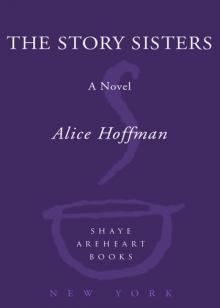 The Story Sisters
The Story Sisters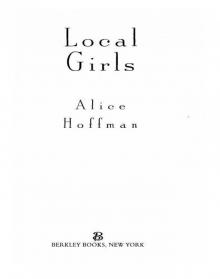 Local Girls
Local Girls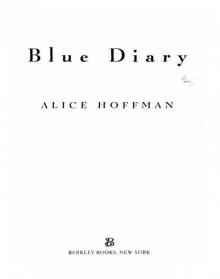 Blue Diary
Blue Diary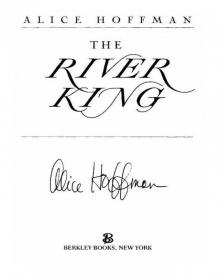 The River King
The River King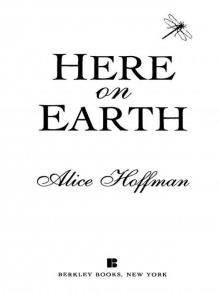 Here on Earth
Here on Earth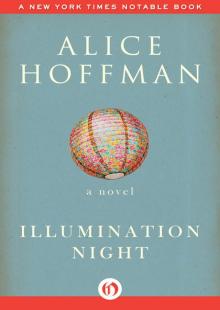 Illumination Night: A Novel
Illumination Night: A Novel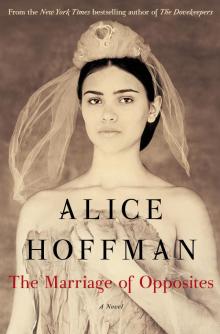 The Marriage of Opposites
The Marriage of Opposites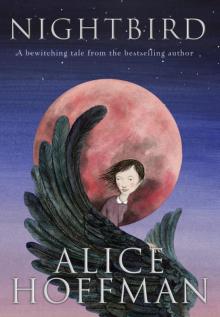 Nightbird
Nightbird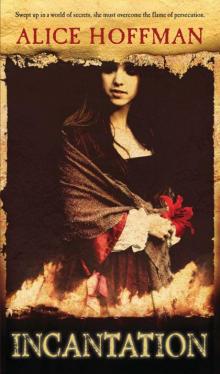 Incantation
Incantation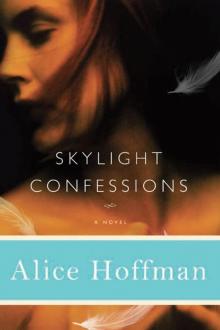 Skylight Confessions
Skylight Confessions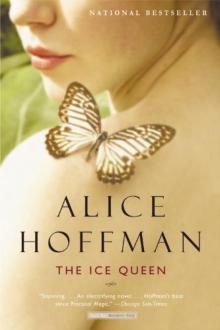 The Ice Queen
The Ice Queen Second Nature
Second Nature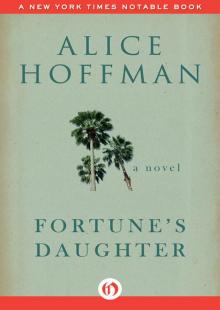 Fortune's Daughter: A Novel
Fortune's Daughter: A Novel Seventh Heaven
Seventh Heaven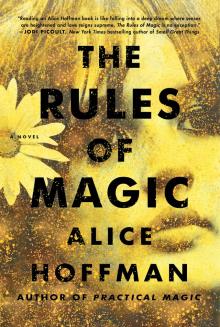 The Rules of Magic
The Rules of Magic The Red Garden
The Red Garden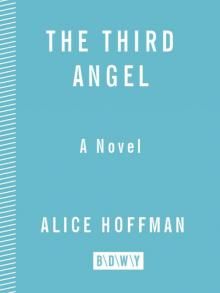 The Third Angel
The Third Angel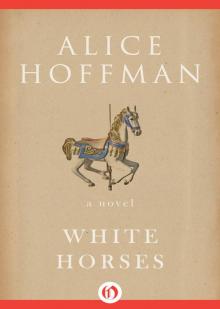 White Horses
White Horses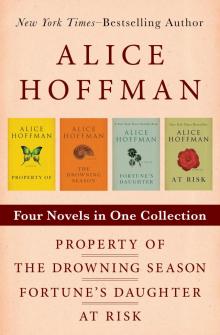 Property of / the Drowning Season / Fortune's Daughter / at Risk
Property of / the Drowning Season / Fortune's Daughter / at Risk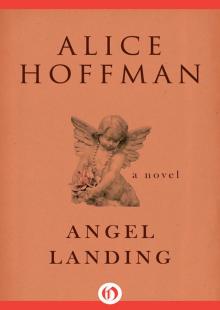 Angel Landing
Angel Landing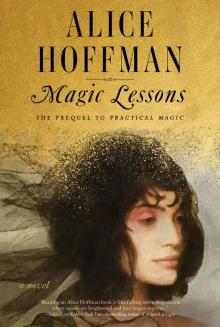 Magic Lessons
Magic Lessons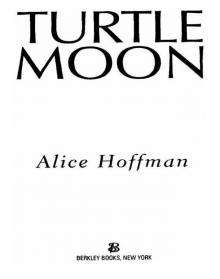 Turtle Moon
Turtle Moon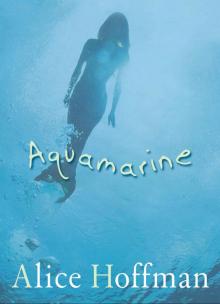 Aquamarine
Aquamarine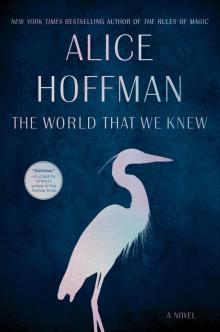 The World That We Knew
The World That We Knew Faithful
Faithful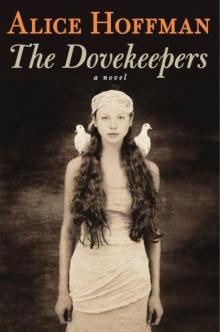 The Dovekeepers
The Dovekeepers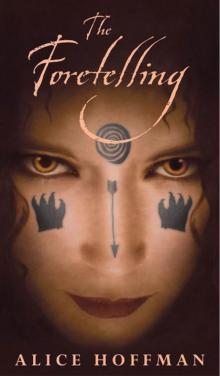 The Foretelling
The Foretelling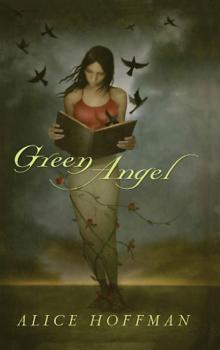 Green Angel
Green Angel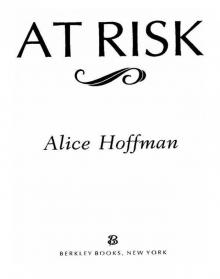 At Risk
At Risk Green Heart
Green Heart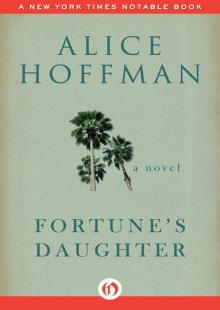 Fortune's Daughter
Fortune's Daughter Faerie Knitting
Faerie Knitting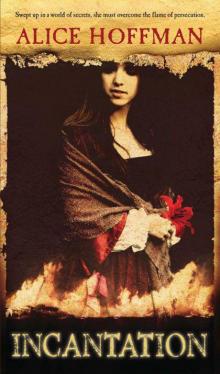 Incantation (v5)
Incantation (v5) Green Witch
Green Witch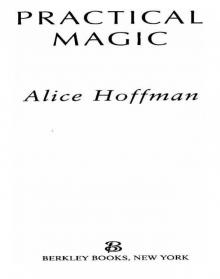 Practical Magic
Practical Magic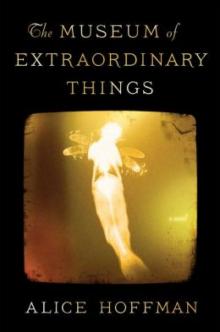 The Museum of Extraordinary Things
The Museum of Extraordinary Things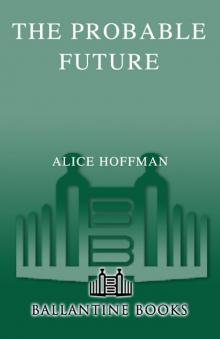 The Probable Future
The Probable Future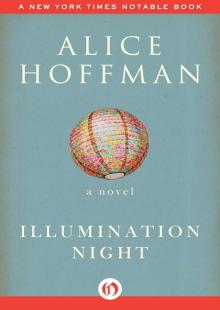 Illumination Night
Illumination Night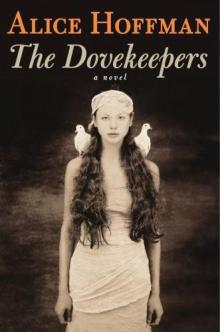 The Dovekeepers: A Novel
The Dovekeepers: A Novel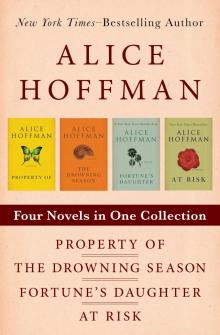 Property Of, the Drowning Season, Fortune's Daughter, and At Risk
Property Of, the Drowning Season, Fortune's Daughter, and At Risk